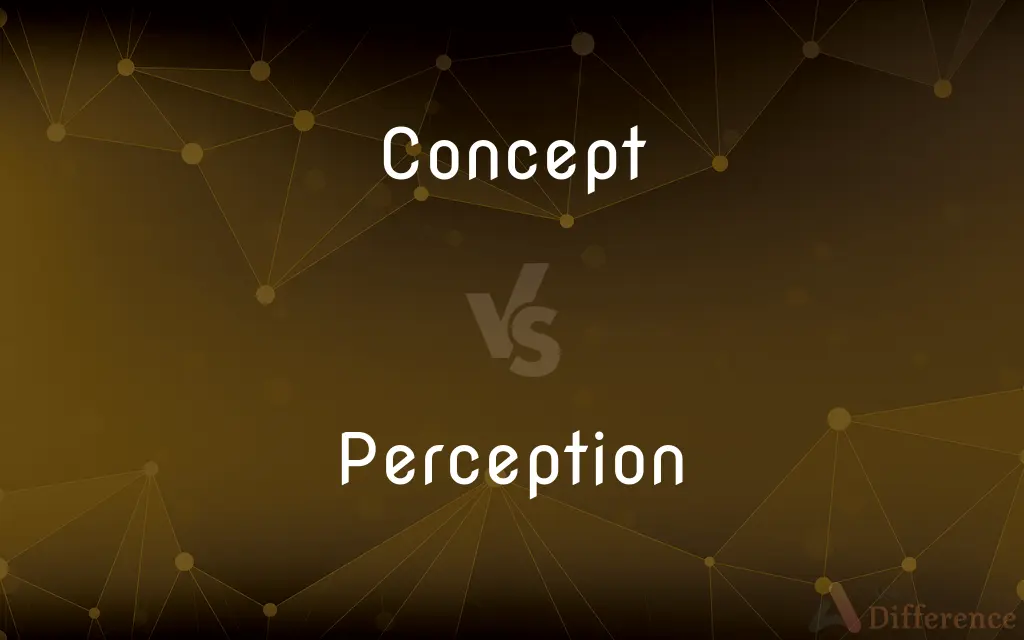Concept vs. Perception — What's the Difference?
By Maham Liaqat & Urooj Arif — Updated on April 9, 2024
A concept is a general idea or understanding, often abstract, while perception is the process of interpreting sensory information. Concepts are cognitive, whereas perceptions are sensory and interpretative.

Difference Between Concept and Perception
Table of Contents
ADVERTISEMENT
Key Differences
A concept represents a mental grouping of similar objects, events, or ideas based on shared properties, serving as the building blocks of thought and communication. It is an abstract representation that helps individuals categorize and make sense of the world. Whereas, perception involves the interpretation of sensory input through the senses, like sight and sound, leading to the recognition and understanding of the physical world around us.
Concepts are often universal, transcending individual experiences, and can be communicated and shared among different individuals or cultures. They enable abstract thinking and problem-solving by allowing us to generalize from specific instances. On the other hand, perception is subjective, varying significantly from person to person based on biological, psychological, and environmental factors, influencing how each individual experiences the world.
The formation of concepts is a cognitive process that involves learning, memory, and sometimes, a conscious understanding of the principles or properties that define a particular category. Conversely, perception is an immediate process that begins with sensory input and results in a personal interpretation of the external environment, often happening unconsciously.
While concepts are static and remain unchanged until they are redefined or expanded upon, perceptions are dynamic and can change rapidly with new information or changes in context. This dynamic nature of perception allows for the immediate adaptation to the environment but can also lead to misinterpretations.
Concepts and perceptions, though distinct, interact closely within cognitive processes. Perceptions can influence the formation and adjustment of concepts, while existing concepts can shape the way we perceive new information. This interaction is fundamental to learning and adapting to new experiences.
ADVERTISEMENT
Comparison Chart
Nature
Cognitive, abstract.
Sensory, interpretative.
Process
Involves learning, memory, abstraction.
Involves sensory input, interpretation.
Subjectivity
More universal and shared.
Highly subjective, varies among individuals.
Change
Static until redefined.
Dynamic, changes with context and information.
Role in Cognition
Building blocks of thought and communication.
Immediate interpretation of the environment.
Compare with Definitions
Concept
Facilitates communication by providing common terms for complex ideas.
The concept of democracy is debated in political science.
Perception
Can be influenced by past experiences, expectations, and cultural background.
Her perception of time was affected by her culture.
Concept
A mental construct that organizes knowledge.
The concept of gravity explains why objects fall towards the Earth.
Perception
The process of interpreting sensory information from the environment.
Perception of color varies depending on light conditions.
Concept
An abstract idea representing a category of objects or events.
The concept of freedom is valued in many societies.
Perception
Involves immediate sensory experience and interpretation.
His perception of the music was influenced by his mood.
Concept
Enables abstract thinking and problem-solving.
The concept of conservation is crucial in environmental science.
Perception
Subjective and can differ markedly between individuals.
People's perception of risk can influence their decisions.
Concept
Can be formed through observation, learning, or direct instruction.
Children develop the concept of numbers through play and education.
Perception
Results in a personal understanding of the external world.
The artist's unique perception of reality is evident in his paintings.
Concept
Concepts are defined as abstract ideas or general notions that occur in the mind, in speech, or in thought. They are understood to be the fundamental building blocks of thoughts and beliefs.
Perception
Perception (from the Latin perceptio, meaning gathering or receiving) is the organization, identification, and interpretation of sensory information in order to represent and understand the presented information or environment.All perception involves signals that go through the nervous system, which in turn result from physical or chemical stimulation of the sensory system. For example, vision involves light striking the retina of the eye; smell is mediated by odor molecules; and hearing involves pressure waves.
Concept
An abstract idea
Structuralism is a difficult concept
The concept of justice
Perception
The process of perceiving something with the senses
The perception of a faint sound.
Concept
A general idea or understanding of something
The concept of inertia.
The concept of free will.
Perception
An instance of this
Sense perceptions.
Concept
A plan or original idea
The original concept was for a building with 12 floors.
Perception
The process or state of being aware of something
The perception of time.
Concept
A unifying idea or theme, especially for a product or service
A new restaurant concept.
Perception
Insight or knowledge gained by thinking
The perception that inheritance must be coded in DNA.
Concept
Having an experimental or strikingly different design, especially to test or demonstrate new features
A concept car.
Perception
The capacity for such insight or knowledge
Theories of how to enhance human perception.
Concept
An abstract and general idea; an abstraction.
Perception
An insight or point of knowledge
The article is full of astute perceptions.
Concept
Understanding retained in the mind, from experience, reasoning and imagination; a generalization (generic, basic form), or abstraction (mental impression), of a particular set of instances or occurrences (specific, though different, recorded manifestations of the concept).
Perception
An interpretation or impression; an opinion or belief
Doctors working to change the public perception of certain diseases.
Concept
(generic programming) A description of supported operations on a type, including their syntax and semantics.
Perception
The organisation, identification and interpretation of sensory information.
Concept
To conceive; to dream up
Perception
Conscious understanding of something.
Have perception of time
Concept
An abstract general conception; a notion; a universal.
The words conception, concept, notion, should be limited to the thought of what can not be represented in the imagination; as, the thought suggested by a general term.
Perception
Vision (ability)
Concept
An abstract or general idea inferred or derived from specific instances
Perception
Acuity
Perception
(cognition) That which is detected by the five senses; not necessarily understood (imagine looking through fog, trying to understand if you see a small dog or a cat); also that which is detected within consciousness as a thought, intuition, deduction, etc.
Perception
The act of perceiving; cognizance by the senses or intellect; apperhension by the bodily organs, or by the mind, of what is presented to them; discernment; apperhension; cognition.
Perception
The faculty of perceiving; the faculty, or peculiar part, of man's constitution by which he has knowledge through the medium or instrumentality of the bodily organs; the act of apperhending material objects or qualities through the senses; - distinguished from conception.
Matter hath no life nor perception, and is not conscious of its own existence.
Perception
The quality, state, or capability, of being affected by something external; sensation; sensibility.
This experiment discovereth perception in plants.
Perception
An idea; a notion.
Perception
The representation of what is perceived; basic component in the formation of a concept
Perception
A way of conceiving something;
Luther had a new perception of the Bible
Perception
The process of perceiving
Perception
Knowledge gained by perceiving;
A man admired for the depth of his perception
Perception
Becoming aware of something via the senses
Common Curiosities
How do concepts differ from perceptions?
Concepts are cognitive and abstract, often universal, while perceptions are sensory, subjective interpretations of the environment.
What is a concept?
A generalized idea representing a category of objects, events, or qualities based on commonalities.
Are concepts and perceptions interconnected?
Yes, they interact closely, with perceptions influencing the formation of concepts and concepts affecting how we interpret sensory information.
Can perceptions influence concepts?
Yes, perceptions can shape and modify our concepts based on new sensory information or experiences.
Can perception be trained or improved?
Yes, through experience and practice, individuals can enhance their perceptual skills, such as discernment of sensory details.
How do concepts aid in learning?
By categorizing and organizing knowledge, concepts facilitate understanding, recall, and application of information in new situations.
What is perception?
The process of obtaining, interpreting, selecting, and organizing sensory information.
Why is understanding the difference between concept and perception important?
It helps in recognizing how we structure knowledge and interpret the world, which is crucial for communication, learning, and problem-solving.
Do all cultures share the same concepts?
While many concepts are universal, cultural variations can lead to differences in how concepts are understood and applied.
Is the concept formation a conscious process?
Concept formation can be both conscious and unconscious, depending on the complexity of the concept and the context in which it is learned.
What impact do perceptions have on art and creativity?
Individual perceptions play a crucial role in artistic expression and creativity, allowing artists to present unique interpretations of their world.
How does language influence our concepts?
Language provides the labels and categories necessary for concept formation and significantly influences how we organize and communicate our thoughts.
How can two people perceive the same thing differently?
Differences in perception can arise from individual variations in sensory processing, past experiences, expectations, and cultural backgrounds.
What role do perceptions play in our daily life?
Perceptions allow us to navigate and interact with our environment, influencing our decisions, actions, and understanding of reality.
Can technological devices influence our perceptions?
Yes, technologies like VR and AR can alter sensory inputs, thus affecting how we perceive and interpret our environment.
Share Your Discovery

Previous Comparison
Vendor vs. Hawker
Next Comparison
Reimbursement vs. RefundAuthor Spotlight
Written by
Maham LiaqatCo-written by
Urooj ArifUrooj is a skilled content writer at Ask Difference, known for her exceptional ability to simplify complex topics into engaging and informative content. With a passion for research and a flair for clear, concise writing, she consistently delivers articles that resonate with our diverse audience.















































